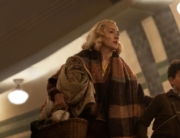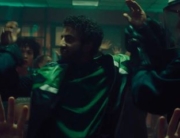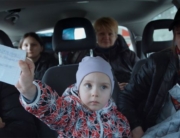Before the Spanish island of Ibiza became the center of the international clubbing scene, there were longtime German and French expatriates who had turned their backs on the wreckage of World War II to live a simpler life. In the first European film shot in digital 6K, and the eighth collaboration between director Barbet Schroeder and cinematographer Luciano Tovoli, mornings spent catching fish in a cove and evenings eating by candlelight look idyllic. Sunsets overlooking the Mediterranean are always gorgeous here, whether in 2000 when the film opens and closes, or 10 years earlier, when most of the drama takes place. The setting is an ironic contrast to the dark questions of moral responsibility that finally need sunshine.
Far away, the fall of the Berlin Wall and the following reunification of Germany impact Martha Sagell (Marthe Keller), who is warned by her German lawyer that she has to deal with her valuable property she has inherited near the Black Forest. She refuses, saying in English “I would have to go back to Germany.” The new European electronica music, as well as the island’s nascent nightlife, brings a handsome 25-year-old neighbor, Jo Gellert (Max Riemelt), who has come from Germany to compose and work as “DJ Gello.” She’s put off more by his preference for Riesling wine from the Rhine and his Volkswagen than for his taste in music; she declaims in English that Hitler would be happy the “People’s Car,” built by slave labor during the war, was responsible for Germany’s postwar “economic miracle,” as if all is forgiven. He shrugs off this “ancient history,” and when his manager comes by to discuss local gigs (there really is a club called Amnesia), she doesn’t let on she can understand their conversation in German, even as they talk about her.
Meanwhile, the two single souls keep spending more time together. Martha challenges Jo to finally learn to swim and insert his own composed tracks into his club mixes. He finds a local herb for their dinners and encourages her to dance and play her old cello in the same room where the photograph of her Jewish music teacher is prominently displayed—she last saw him on the border between Switzerland and Germany during the war. (She makes an exception to her rigid rules against Germany for Beethoven.) At the point where Jo complains to her about the pressure from his mother, a doctor, to give up music to come back home before the East Germans take all the jobs, Martha has become either his maternal confidante or platonic romantic interest.
While their warm friendship is sweet, the real world, past and present, intrudes when his caustic mother, Elfriede (Corinna Kirchhoff), and his beloved grandfather Bruno (Bruno Ganz in a key small but emotional role) arrive for a climactic visit. As they realize Martha is German, multi-generation confrontations are set off, with accusations and recriminations about life under, and exile from, the Nazis and the Russian occupation.
In a film about very personal feelings, in comparison to his popular thrillers, Schroeder based Martha’s intensity against her native country on his expatriate mother’s experience. Keller, too, related to the role because she grew up with a German father disgusted by the rise of Nazism and who refused to have anything to do with his fatherland after settling in Switzerland in the 1930s. The frank back-and-forth at the family dinner is reminiscent of the discussions in Janina Quint’s documentary Germans & Jews (2016). Like in the real Berlin, there is hope in the younger generations’ preference for honesty and exposure to the light. The preternatural light of Ibiza is a beautiful place to finally start.







Leave A Comment